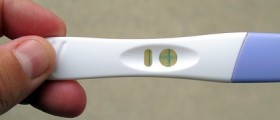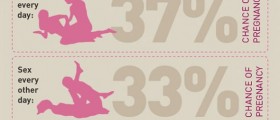The Time of the Month
Menstrual cycle is a physiological process that takes place in the female body and lasts for, on average, 28 days every month. Menstrual cycle begins once a woman reaches sexual maturity with the beginning of puberty, and ends with the onset of menopause, while its specific duration is individual, and in many cases genetically passed on. Further, the female ovaries generate an egg once a month that will either be fertilized or removed from the body through the menstrual blood. As the endocrine system prepares the egg, it also produces various hormones that prepare the system, or primarily the uterus, for the possibility of fertilization. In case the egg gets fertilized the uterus is denser and the hormones are optimized and ready to house it for the next nine months. In most cases, there will be no fertilization, and the menstrual blood will wash off everything that was prepared in the uterus, including the egg.
Symptoms of the Menstrual Cycle
The symptoms of the menstrual cycle are different for every woman, but there are some distinctive characteristics that are shared by the most. In the mid-cycle, during the ovulation or the producing of the egg, many women do not feel any signs at all that something is going on in their reproductive organs. Notwithstanding, there is always an exception, where a woman will feel a minor discomfort during the production phase. However, many women, if not all, feel the discomfort produced by the menstruation, and the period that precedes it. During menstruation, the uterus contracts to discharge all the material produced to welcome a fertilized egg, and as a result causes serious abdominal pain known to every sexually mature woman. In some rare instances, an individual will require special medical attention to deal with the severity of the pain produced by menstruation. Other symptoms that are characteristic for this time of the month include headaches, back, breast, and abdominal pain, irritability, increased appetite, and so on, which are produced by the hormonal imbalance evident during this time. There are women who have trouble focusing their attention on a task at hand, and who feel depressed and debilitated. For the most part, these symptoms comprise the premenstrual syndrome, or PMS, while in some rare instances this syndrome will escalate into premenstrual dysphoric disorder.
Tender Breasts as Symptoms of the Menstrual Cycle
As previously mentioned, one of the very distinctive symptoms of the menstrual cycle is tenderness in the breasts, triggered by water retention and hormonal imbalance characteristic for this time of the month. The breasts are overly sensitive as the tissue stretches to accommodate the excess liquid, decreasing the possibility of normal, everyday functioning which includes physical activities, running, or sometimes even doing house chores. In many cases, the sensitivity starts a few days before the onset of menstruation and lasts for the duration of the bleeding, while in others it can take longer to stop. Such occurrence in turn increases irritability, and a general feeling of discomfort. Further, women who are a little bit older and have had their cycles for a while may experience breast tenderness on a larger scale as their hormones are imbalanced even more. The main reason for this is the high level of estrogen, a female sex hormone, which is overly present in the body prior to and during menstruation.
Things Women Could Do to Alleviate the Symptoms
As with any other medical condition, there are many things that could be done to reduce the presence of the symptoms. Many common activities that women engage in on everyday basis, such as drinking large amounts of coffee, stimulate further tenderness, and a decrease in the intake would definitely reduce the sensitivity. However, it should be noted that the overly sensitive breasts could be a sign of other underlying diseases, such as breast cancer. It is advised that every woman has regular breast cancer exams to rule out the possibility of the development of any cysts or tumors. If, on the other hand, a medical care provider confirms the breast tenderness is only a symptom of PMS, there are a couple of things every woman can do to decrease her discomfort. For one, having a good bra goes a long way in any stage of the cycle, and especially during the period. It will support the breasts, eliminate their movement, and make the tenderness more bearable. Many women will opt for over-the-counter drugs that are good for reducing the back and abdominal pain, as well as the uncomfortable feeling produced by the full breasts. Further, any kind of physical activity is known to reduce the symptoms of PMS, including the breast sensitivity, and it should especially be engaged prior to and during menstruation. Not surprisingly, a good, healthy diet always helps, while junk food will make the bloating even more prominent.
















Your thoughts on this
Loading...